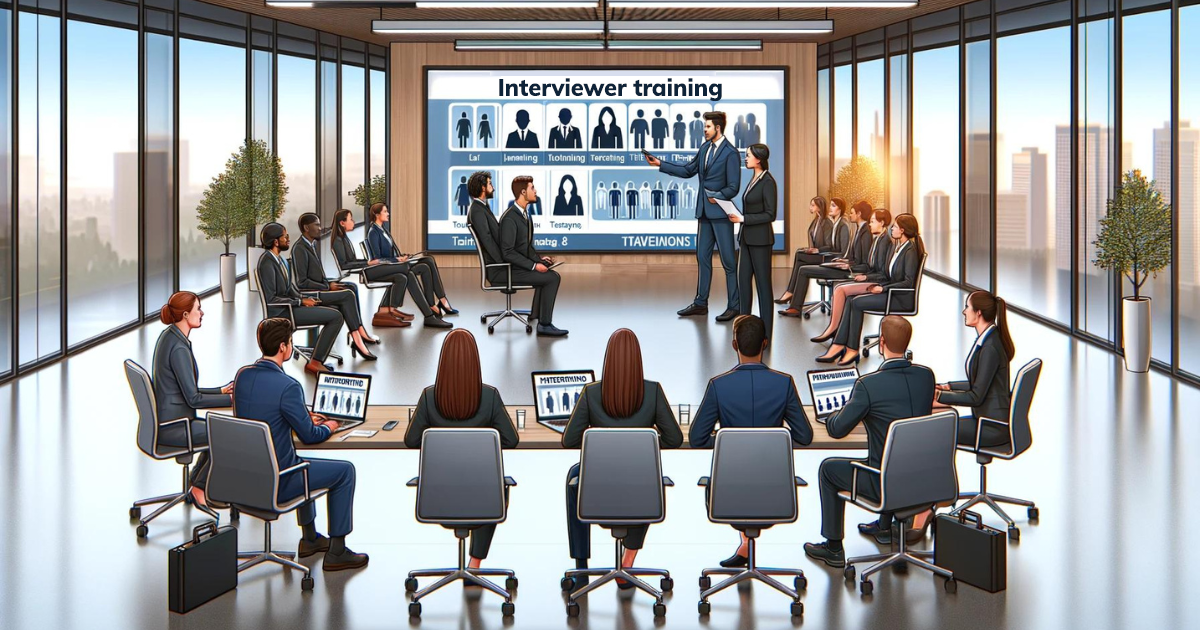Interviews are a critical part of the hiring process. A well-conducted interview can provide valuable insight into a candidate's personality, experience, and cultural fit. However, not all interviewers are equally skilled or trained. Untrained interviewers may ask inappropriate questions, miss important details, or make decisions based on their biases. In this blog post, we'll explore the importance of training interviewers to maximize interview success.
According to the recent article published by AIHR, almost half (48%), of HR managers admitted that bias impacted their choice of candidates.
Key Aspects of Interviewer Training: Understanding the Roles & Responsibilities
- Interviewers hold a crucial position in the hiring process. They evaluate candidates, assess qualifications, and determine organizational fit. However, Untrained interviewers may struggle, resulting in poor hiring decisions.
- Interviewer training serves as the foundation of a structured approach aimed at equipping individuals with essential skills, knowledge, and competencies for effective interviewing process.
Benefits of Interviewer training
Investing in interviewer training can yield significant benefits for the organization, including:
- Improved interviewer skills: Trained interviewers have a better understanding of the interview process, which allows them to conduct more thorough and insightful interviews.
- Increased accuracy and consistency in interviewing: Interviewer training can help ensure that all candidates are evaluated using the same criteria, reducing the risk of bias and ensuring a fair and consistent hiring process.
- Better candidate experience: A well-conducted interview can provide candidates with a positive impression of the organization, even if they are not ultimately hired. This can help improve the organization's reputation and make it easier to attract top talent in the future.
- Legal compliance and anti-discrimination training: Interviewers receive training on legal requirements, including prohibited questions and anti-discrimination laws, ensuring equitable treatment of all candidates.
- Interviewing techniques and best practice: Interviewer training should provide guidance on how to conduct effective interviews, including how to ask open-ended questions, active listening, and how to assess candidates' qualifications and fit for the role.
- Company culture and values training: Interviewers should be trained on the company's culture and values to ensure that they are evaluating candidates based on their fit with the organization's mission and values.
- Practice and feedback sessions: To maximize the benefits of interviewer training, interviewers should have the opportunity to practice their skills and receive feedback from their peers and trainers.

Optimizing Interviewer Training Approaches
There are several methods for implementing interviewer training, including:
- Internal training programs: Organizations can develop internal training programs that are tailored to their specific needs and culture.
- External training resources: There are many external resources available, including books, videos, and online courses, that can provide valuable training for interviewers.
- Mentorship and coaching programs: Pairing experienced interviewers with less-experienced colleagues can provide valuable on-the-job training and feedback.
- Ongoing evaluation and improvement: Organizations should regularly evaluate the effectiveness of their interviewer training programs and make changes as necessary to improve outcomes.
How Talview Interview Insights plays a role for effective interviewer training
Talview Interview Insights is an AI-powered technology that analyzes interview recordings to provide comprehensive feedback to interviewers. This technology can be particularly helpful for interviewer training in the following ways:
- Objectivity: Provides objective feedback that is not influenced by personal biases, allowing interviewers to get an accurate assessment of their performance.
- Identifying patterns: The technology can identify patterns in interviewer behavior and highlight areas that require improvement.
- Customization: Platform can be customized to align with the organization's specific interview process and requirements, ensuring that interviewers receive targeted feedback that is relevant to their role.
- Competency-based evaluation: Evaluates competencies such as communication skills, problem-solving skills, and team collaboration skills to help interviewers improve their overall performance.
- Enhanced Candidate Experience: Helps interviewers deliver a more positive experience for candidates by providing valuable insights and constructive feedback.
Conclusion
Investing in interviewer training can yield significant benefits for the organization, including improved interviewer skills, increased accuracy and consistency in interviewing, reduced legal risks, and a better candidate experience. To maximize these benefits, organizations should provide comprehensive training that covers key areas such as interviewing techniques, legal compliance, company culture and values, and practice and feedback sessions.
To elevate your interviewer training and achieve greater hiring success, contact us today to learn more.


Leave a Reply